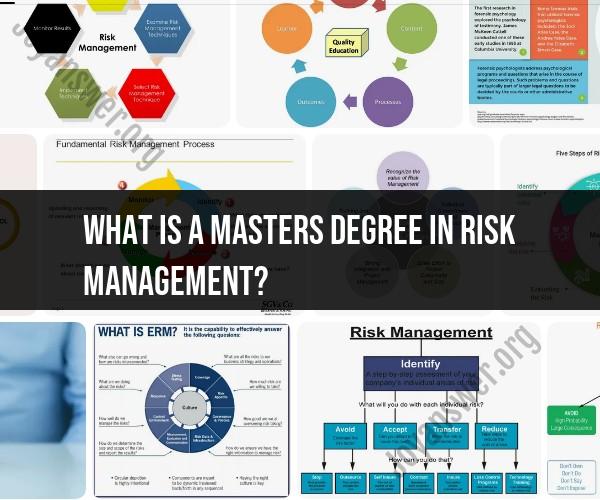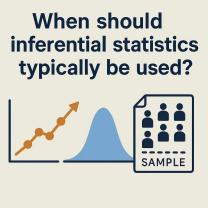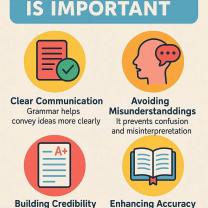What is a Masters degree in risk management?
A Master's degree in risk management is a graduate-level program that focuses on preparing students with the knowledge and skills necessary to assess, analyze, and manage various types of risks that organizations face. This field is particularly relevant in the business, finance, insurance, and financial services industries, where managing risk is crucial for long-term success and stability.
Here is an overview of what you can typically expect from a Master's degree program in risk management:
1. Core Curriculum: Master's programs in risk management often include a core curriculum that covers fundamental topics related to risk analysis, risk assessment, risk mitigation, and risk communication. Some of the core courses may include:
- Risk Management Principles and Practices
- Financial Risk Management
- Enterprise Risk Management (ERM)
- Insurance and Risk Financing
- Quantitative Methods for Risk Analysis
- Legal and Regulatory Aspects of Risk Management
- Risk Modeling and Simulation
2. Specialized Tracks: Many programs offer specialized tracks or concentrations within risk management to cater to different career interests. These tracks might include areas such as financial risk management, operational risk management, insurance and actuarial science, or cybersecurity risk management.
3. Quantitative Analysis: Risk management often involves quantitative analysis, so students in these programs are typically exposed to statistical and mathematical techniques for risk modeling and analysis. This includes the use of statistical software and financial modeling tools.
4. Industry-Relevant Tools: Students may learn to use industry-standard risk management tools and software, which can be valuable in their careers. These tools can include risk assessment software, financial modeling platforms, and data analytics tools.
5. Case Studies and Practical Experience: Many programs incorporate real-world case studies, group projects, and internships to provide students with practical experience in applying risk management concepts and strategies.
6. Risk Governance and Compliance: Programs often cover topics related to risk governance, compliance, and the regulatory framework within which organizations operate. This is particularly important for industries with strict regulatory requirements, such as banking and insurance.
7. Ethical and Legal Considerations: Students may explore the ethical and legal aspects of risk management, including issues related to corporate governance, ethics in decision-making, and risk-related legal obligations.
8. Research and Analysis: In some programs, students may be required to conduct research in the field of risk management and present their findings as part of their degree requirements.
9. Industry Networking: Many risk management programs provide opportunities for students to network with professionals in the field through seminars, workshops, guest lectures, and alumni networks.
10. Professional Certification: Some programs may prepare students for professional certifications such as the Chartered Enterprise Risk Analyst (CERA), Certified Risk Manager (CRM), or Financial Risk Manager (FRM), which can enhance their career prospects.
A Master's degree in risk management equips graduates with the knowledge and skills to work in various roles within organizations, including risk analysts, risk managers, compliance officers, insurance underwriters, and financial analysts. These professionals play a crucial role in helping organizations make informed decisions and navigate the complex landscape of risks they face in today's business environment.
Pursuing a Master's Degree in Risk Management: What You Need to Know
A master's degree in risk management is a specialized degree that prepares students to identify, assess, and mitigate risks in a variety of industries. Risk managers play a vital role in protecting organizations from financial, operational, and reputational losses.
To pursue a master's degree in risk management, you will typically need to have a bachelor's degree in business administration, finance, or a related field. Some programs may also require work experience in risk management or a related field.
Master's degree programs in risk management typically take two years to complete. The curriculum typically covers topics such as:
- Risk identification and assessment
- Risk mitigation and control
- Enterprise risk management
- Financial risk management
- Operational risk management
- Strategic risk management
- Risk management for specific industries, such as healthcare, finance, and technology
In addition to coursework, many master's degree programs in risk management also require students to complete a capstone project or internship. This allows students to apply what they have learned in the classroom to a real-world setting.
Advancing Your Career: The Benefits of a Master's Degree in Risk Management
A master's degree in risk management can open up a number of career opportunities. Risk managers are in high demand in a variety of industries, including:
- Banking and finance
- Insurance
- Healthcare
- Technology
- Manufacturing
- Government
Risk managers can hold a variety of titles, such as:
- Risk manager
- Risk analyst
- Risk consultant
- Chief risk officer
- Enterprise risk manager
Risk managers typically earn high salaries. According to the Bureau of Labor Statistics, the median annual salary for risk managers was $132,270 in 2021.
Mastering Risk: Exploring the Curriculum of a Risk Management Master's Program
The curriculum of a master's degree program in risk management will vary depending on the specific program. However, most programs will cover the following topics:
- Risk identification and assessment: This involves identifying the risks that an organization faces and assessing the likelihood and impact of each risk.
- Risk mitigation and control: This involves developing and implementing strategies to reduce the likelihood and impact of risks.
- Enterprise risk management: This involves integrating risk management into all aspects of an organization's operations.
- Financial risk management: This involves identifying, assessing, and managing financial risks, such as market risk, credit risk, and liquidity risk.
- Operational risk management: This involves identifying, assessing, and managing operational risks, such as fraud, IT failures, and supply chain disruptions.
- Strategic risk management: This involves identifying, assessing, and managing strategic risks, such as changes in the competitive landscape, technological changes, and regulatory changes.
- Risk management for specific industries: This involves studying the unique risks that are faced by specific industries, such as healthcare, finance, and technology.
In addition to coursework, many master's degree programs in risk management also require students to complete a capstone project or internship. This allows students to apply what they have learned in the classroom to a real-world setting.
Overall, a master's degree in risk management can be a valuable investment for students who are interested in a career in risk management. The degree can open up a number of career opportunities and help students to earn high salaries.











